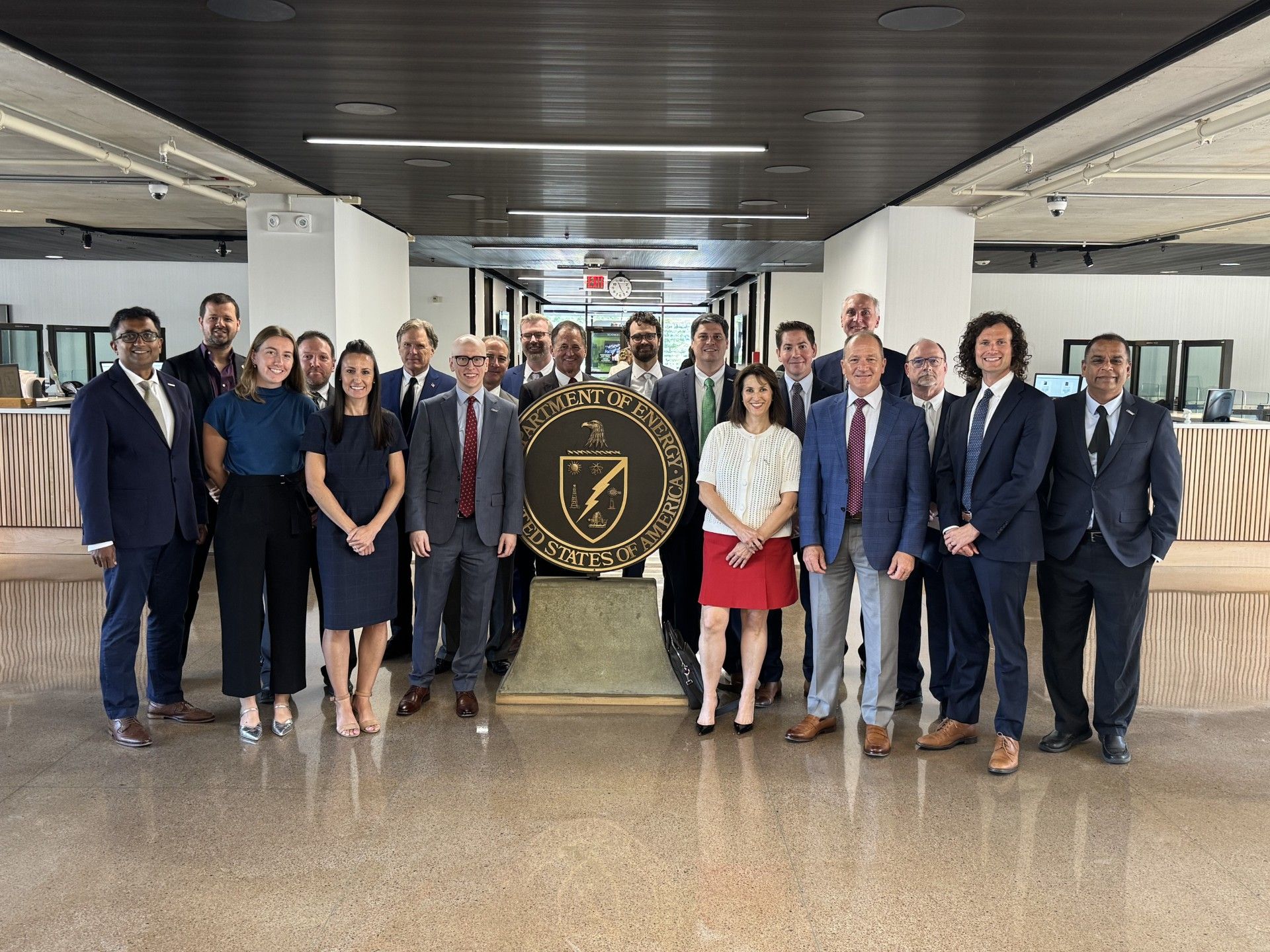Welcome to the August edition of A Capitol View!
Congress is in recess, but SMI remains engaged with staff and executive branch officials to ensure clients’ policy and funding priorities are front and center as annual spending and other bills are finalized this year, and the Trump administration begins dispersing billions in new investments.
One major push is ensuring that the Small Business Innovation Research and Small Business Technology Transfer programs are reauthorized this fall.
For nearly 50 years, SBIR and STTR have been the backbone of some of the most successful technology breakthroughs in the United States. They have seeded critical national security innovations and helped to address some of our nation’s most pressing health and energy challenges. But the programs are set to expire at the end of the fiscal year on Sept. 30.
Fault lines: SMI is supporting a coalition of innovative companies, nonprofits, and research universities taking their message directly to Capitol Hill next month to push back against proposed reforms that would place arbitrary limits on the competitive awards and in the process undermine the merit-based principles of the programs, penalize proven innovators, and threaten the nation’s competitive edge.
The DefendSBIR campaign aims to ensure the programs are renewed and remain aligned with their original intent, contain effective barriers to foreign influence, further empower government agencies, and incentivize faster contracting and scaling up of new technologies.
SMI is working closely with other advocacy groups, including the Small Business Technology Council and the New England Innovation Alliance, on a series of direct engagements and public events with decision makers to ensure we continue to tap into the nation’s most innovative small businesses.
 What’s next: We expect the SBIR/STTR reauthorization debate to be part of final deliberations over the National Defense Authorization Act, with competing Republican and Democratic prescriptions in the mix.
What’s next: We expect the SBIR/STTR reauthorization debate to be part of final deliberations over the National Defense Authorization Act, with competing Republican and Democratic prescriptions in the mix.
“The final language is still under review as conversations with my colleagues in Congress continue,” House Small Business Chair Rep. Roger Williams told Congressional Quarterly. “I have always believed that small businesses are the backbone of our economy and a key part of our national security, and I remain committed to making sure their voices are heard throughout this process.”
Raise your voice: Join us in Washington on September 9 and 10. And follow the DefendSBIR campaign on LinkedIn.
ICYMI: Don’t limit defense innovation by capping small-biz awards
BUDGET
‘CONSTITUTIONAL RESPONSIBILITY.’ Before Congress left town for the August recess, the Senate Appropriations Committee approved its version of the annual defense spending bill, totaling $851.9 billion for the fiscal year starting October 1.
“We can’t build a Golden Dome or restock our munitions or bring back American shipbuilding without a sustained increased investment in all of our national defense,” said Sen. Mitch McConnell (R-KY), who chairs the defense subcommittee.
The House panel passed its version of the spending legislation in June.
‘An accomplishment’: The full Senate also passed a trio of spending bills to fund the Department of Veterans Affairs, the Food and Drug Administration, the Department of Agriculture, new military facilities, and the operations of Congress – a sign that the legislative branch may meet spending deadlines this year and avoid a government shutdown.
“We are on the verge of an accomplishment that we have not done since 2018, and that is, pass appropriations bills across the Senate floor prior to the August recess,” Senate Appropriations Committee Chair Susan Collins (R–Maine) said. “That is exercising our constitutional responsibility for the power of the purse.”
Read up: First three fiscal 2026 appropriations bills pass Senate
More budget news: Senate committee advances funding bills amounting to $1 trillion
Plus: Trump’s big proposed cuts to health and education spending rebuffed by US Senate panel
And ICYMI: Streamlining Procurement for Effective Execution and Delivery and National Defense Authorization Act for Fiscal Year 2026, via Congressional Budget Office.
FEDERAL GRANTS
 ‘BENEFICIAL PURPOSE’: Our team is also closely tracking the impact from more aggressive efforts by the Trump administration to apply stricter oversight on the federal grant making process for both industry and academia.
‘BENEFICIAL PURPOSE’: Our team is also closely tracking the impact from more aggressive efforts by the Trump administration to apply stricter oversight on the federal grant making process for both industry and academia.
In a new executive order, President Trump took aim at certain categories of grants characterized as “offensive waste of tax dollars.”
‘More rigorous evaluation’: “Even for projects receiving Federal funds that serve an ostensibly beneficial purpose, the Government has paid insufficient attention to their efficacy,” it added, noting that “a substantial portion of many Federal grants for university-led research goes not to scientific project applicants or groundbreaking research, but to university facilities and administrative costs.”
According to an accompanying fact sheet, award decisions “will undergo more rigorous evaluation by political appointees and subject matter experts to ensure they benefit the American public, align with Administration priorities, and are coordinated across agencies to avoid duplication.”
What’s next: We are anticipating follow-up instructions from the Office of Management and Budget and individual executive branch agencies, according to Dennis Padilla, SMI’s Senior Contracting Specialist & Federal Business Advisor.
“I don’t think we’ll have the final word on any of this until OMB and the Agencies actually issue implementation directives,” Padilla said. “I believe folks, even in government, won’t know the full impact until the directions are issued in the next 30 days,” he added, and the changes are subsequently reflected in the Code of Federal Regulations that govern cost and audit requirements for federal awards.
Read more: Trump executive order gives politicians control over all federal grants, alarming researchers
CRITICAL MINERALS
‘INCREDIBLE MILESTONE’: SMI is dedicated to helping fill key gaps in our domestic supply chains and couldn’t be more pleased to support MP Materials’ historic effort to address a dangerous shortfall in rare earth minerals.
In the latest development, the Pentagon’s Office of Strategic Capital has executed its first direct loan of $150 million to the company to add heavy rare earth separation capabilities to its processing facility in Mountain Pass, California.
‘Active action’: Emil Michael, Under Secretary of Defense for Research and Engineering, called it an “incredible milestone.”
“Through this loan, we are taking decisive action to restore our domestic critical minerals supply chain, revive our industrial base, and rebuild our military to achieve President Trump’s goal of peace through strength,” he said.
The development follows the Pentagon agreement last month to buy neodymium-praseodymium (NdPr) materials produced by MP Materials for at least 10 years to help ensure a vibrant domestic supply.
Why it matters: The rare earth minerals are vital for making high-strength permanent magnets used in electric motors, wind turbines, and electronics, reducing U.S. reliance on China and other foreign sources.
SMI team members Jeffrey Leahey, Samm Gillard, and Tasden Ingram are fired up to help keep the momentum going.
Read up: OSC Announces First Loan Through DoD Agreement With MP Materials
Plus: MP Materials hits new high as it receives $150M Pentagon loan
Related: Rare-Earth Magnet Maker Raises $65 Million in Push to Counter China
‘INDESPENSIBLE RESOURCES’: The Department of Energy has also kickstarted the process for dispersing nearly $1 billion in a major cost-sharing effort to develop and process critical minerals and materials.
The agency has issued several fresh notices of funding opportunities (NOFO):
- Advanced Materials and Manufacturing Technologies Office (AMMTO): Critical Minerals and Materials Accelerator
- Fossil Energy and Carbon Management (FECM): Mines & Metals Capacity Expansion – Piloting Byproduct Critical Minerals and Materials Recovery at Domestic Industrial Facilities.
- Manufacturing and Energy Supply Chains (MESC): Rare Earth Elements Demonstration Facility.
- Advanced Research Projects Agency-Energy (ARPA-E): Recover Critical Minerals from Industrial Wastewater.
Tune in: A Domestic Critical Minerals and Materials Supply Chains Workshop will be held on August 20.
ENERGY
 FACE TO FACE: SMI was also pleased to help shepherd a series of high level meetings at DOE on behalf of the Battery Advocacy for Technology Transition, or BATT Coalition, to discuss how to strengthen partnerships to secure a domestic critical materials supply chain and effectively implement key tax and other provisions in the recently passed One Big Beautiful Bill.
FACE TO FACE: SMI was also pleased to help shepherd a series of high level meetings at DOE on behalf of the Battery Advocacy for Technology Transition, or BATT Coalition, to discuss how to strengthen partnerships to secure a domestic critical materials supply chain and effectively implement key tax and other provisions in the recently passed One Big Beautiful Bill.
Who’s who: BATT members met with Mike Kopp and Joshua Orlaski, senior and policy advisors to Secretary Wright; Widad Whitman, acting deputy director for batteries and critical materials; Steven Boyd, program manager for batteries and critical materials, and Mallory Clites, technology manager for batteries and critical material supply chains, in the DOE Manufacturing & Energy Supply Chains Office; and Devinn Lambert, technology manager for DOE’s Office of Fossil Energy and Carbon Management.
ACHIEVING CRITICALITY: SMI client Aalo Atomics was among nearly a dozen companies selected by the Department of Energy as part of the Nuclear Reactor Pilot Program.
The demo program, initiated in June, aims to expedite the testing and approval of advanced reactor designs that can be operated outside of the national government laboratories, unlock private funding, and provide a fast-tracked approach to future commercial licensing activities, according to DOE.
The department aims to construct, operate, and achieve criticality of at least three test reactors by July 4, 2026.
“These companies aim to all safely achieve criticality by Independence Day, and DOE will do everything we can to support their efforts,” said Deputy Energy Secretary James Danly.
Read up: Department of Energy Announces Initial Selections for New Reactor Pilot Program
DEFENSE
 ‘BEACON OF INDUSTRIAL PROWESS’: SMI, under the leadership of John Major and Jeremy Steslicki, is psyched to be supporting The Michigan Office of Defense and Aerospace Innovation as it fires up the “Arsenal of Democracy” once again.
‘BEACON OF INDUSTRIAL PROWESS’: SMI, under the leadership of John Major and Jeremy Steslicki, is psyched to be supporting The Michigan Office of Defense and Aerospace Innovation as it fires up the “Arsenal of Democracy” once again.
Home field advantage: Michigan is building on a long, proud legacy. An estimated 30 percent of all war materiel was built in Michigan during World War II.
Today, well over half of what a soldier shoots or drives today is manufactured in Michigan. The state is a nationwide leader in semiconductors, electric batteries, and other key building blocks of our military might, and it offers a highly skilled workforce to expand into new areas such as submarine welding and machining.
“Democracy is under threat on a global scale, not seen since the Cold War,” retired Marine Corps Col. John Gutierrez, the office’s Executive Director, said in a new primer on the effort published in Breaking Defense. “The Russian invasion of Ukraine and China’s attempt to disrupt freedom of navigation in the Taiwan Straits, along with ongoing conflicts in the Middle East, underscore the challenges confronting the United States and its allied nations. Michigan, renowned as the Arsenal of Democracy and a beacon of industrial prowess, holds immense potential.”
HOMELAND SECURITY
 ‘PROBLEM SETS’: The Department of Homeland Security has issued a new solicitation “to rapidly procure innovative commercial maritime capabilities and solutions.”
‘PROBLEM SETS’: The Department of Homeland Security has issued a new solicitation “to rapidly procure innovative commercial maritime capabilities and solutions.”
The areas of interest include: Maritime Technology Innovation and Digital Transformation; Program Oversight and Acquisition Risk Management; Maritime Technology Innovation and Digital Transformation; Program Oversight and Acquisition Risk Management; Lifecycle Sustainment and Operational Readiness; Supply Chain Resilience and Port Infrastructure Risk; Trade Enforcement and Inspection Innovation; Maritime Interdiction and Counter-Illicit Activity; and Maritime Workforce and Industrial Base Development.
‘Novel concepts’: Over the next year the agency is seeking “novel concepts, tools, frameworks, and partnerships to help DHS address persistent and emerging problem sets across this domain,” the solicitation states. “Proposed efforts should aim to improve mission outcomes, increase operational efficiency, and strengthen acquisition and sustainment of maritime capabilities.”
MANUFACTURING
 ‘CUTTING-EDGE MATERIALS’: The White House Office of Science and Technology Policy is seeking input “from all interested parties” to help craft a National Strategic Plan for Advanced Manufacturing.
‘CUTTING-EDGE MATERIALS’: The White House Office of Science and Technology Policy is seeking input “from all interested parties” to help craft a National Strategic Plan for Advanced Manufacturing.
The request for information is looking for novel ideas that “make use of cutting-edge materials and emerging capabilities enabled by the physical and biological sciences, such as nanotechnology, chemistry, and biology,” it states. That means “both new ways to manufacture existing products and the manufacture of new products emerging from new advanced technologies.”
Deadline: Responses are due by September 30, 2025.
‘FRESH OPPORTUNITIES’: The Society of Manufacturing Engineers (SME), an SMI client, is partnering with the Women in Manufacturing Education Foundation to hold a Virtual Career Fair on August 14.
“This isn’t just a job search – it’s a career launchpad,” said SME. “Whether you’re actively seeking your next role or just exploring what’s out there, you’ll walk away with new contacts, fresh opportunities, and a clear path forward in manufacturing.”
LIFE SCIENCES
POSITIONED FOR SUCCESS: SMI VP Dr. Travis Taylor, a former policy officer at the National Institutes of Health’s National Institute of Allergy and Infectious Diseases, will be a featured speaker next month at BioNTX’ iC³ Life Science Summit in Dallas.
The summit will convene federal and state government leaders and research institutions to navigate the twists and turns in funding and policy priorities.
“With funding options becoming more complex and challenging to navigate, gaining clarity and strategic insight is essential to successfully access the resources that will advance your work,” according to the organizers. “This session will provide practical guidance and expert perspectives to help you cut through the complexity and position your organization for success.”
Learn more: 2025 iC³ Life Science & Healthcare Innovation Summit
CLIENTS IN THE NEWS
Is the U.S. ready for the next war?
Young entrepreneur runs American-made boot company
UMASS Lowell, Headlamp Help Veterans Launch Pos-Military Careers Through Vets RISE
VP JD Vance Visits Metallus to Highlight the Significance of Investing in American Workers






